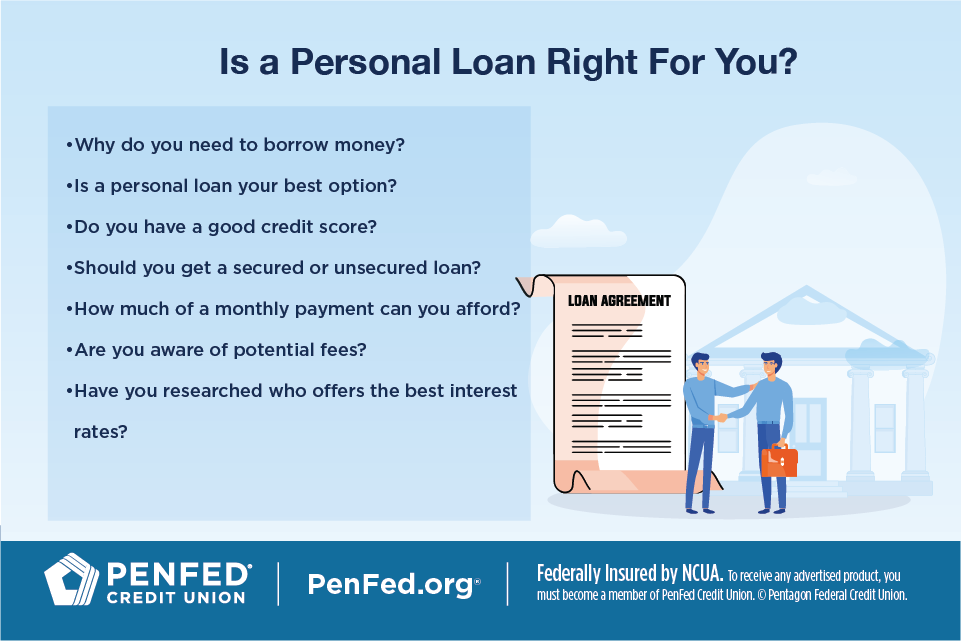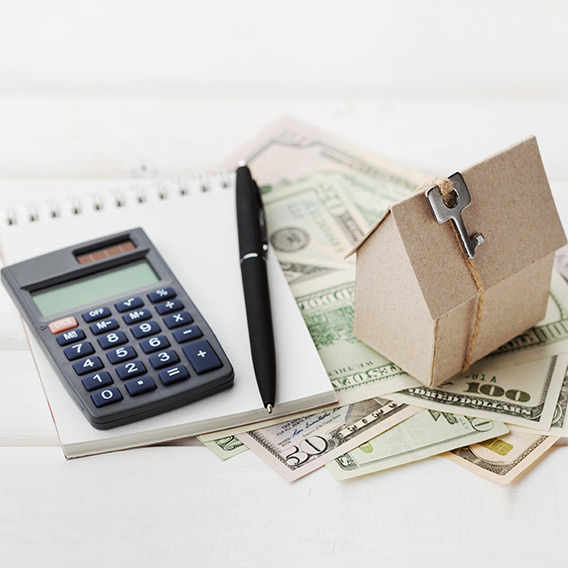Personal Loan
What to Know Before Taking Out a Personal Loan
What you'll learn: Whether or not you should take out a personal loan
EXPECTED READ TIME:4 MINUTES
Whether you're consolidating debt or hitting your home repair to-do list, you may need more money than you have on hand. One of your best options for borrowing money is a personal loan. Before you apply, use this handy list of questions to figure out if a personal loan is right for your situation.

Why Do You Need to Borrow Money?
Taking out a personal loan is a commitment. To determine if it's the right choice for you, ask yourself if you're clear on your reason for taking out a personal loan.
Think about whether your reason is a want or a need. If it's a need, is it immediate, or could you budget for it?
Even though a personal loan can be used for nearly anything, borrowers typically take out personal loans for:
- Debt consolidation
- Quick home or vehicle repairs
- Medical bills
- Wedding or vacation costs
- Moving expenses
Is a Personal Loan Your Best Option?
Even though personal loans are a common way to borrow money, there are other options to consider. Here's a look at some alternatives that might suit you better.
Credit Card
- Offers a revolving line of credit that can be used as needed
- Often has a higher interest rate than a personal loan
- May have a rewards program to earn points, cash back, or travel perks
Home Equity Loan
- Requires your home as collateral, which means your home can be repossessed if you can't make your payments
- Often has a lower interest rate than a personal loan
- Loan process takes several weeks
Ask yourself if you're clear on your reason for taking out a personal loan.
Home Equity Line of Credit (HELOC)
- Requires your home as collateral, which means your home can be repossessed if you can't make your payments
- Often has a lower interest rate than a personal loan, but the rate may change throughout the life of your HELOC
- Offers a revolving line of credit up to an approved amount instead of a lump payment
- Loan process takes several weeks
Personal Line of Credit
- Offers a revolving line of credit that can be used as needed
- May have a higher interest rate than a personal loan
- Might have additional fees
Of course, your financial situation and whether you're a homeowner will help to guide your choice.
You can check your credit for free through the top three credit bureaus — Experian, Equifax, and TransUnion.
Do You Have a Good Credit Score?
Your credit score plays an important role in qualifying for a personal loan, but do you know where your credit stands? You can check your credit for free through the top three credit bureaus — Experian, Equifax, and TransUnion — or other sources, and it won't impact your score.
What's Considered a Good Credit Score?
As a reference point, these are the credit score benchmarks for good, very good, and excellent levels:
- Fair: 630-689
- Good: 690-719
- Excellent: 720 and above
If your credit score is below 690, you may be considered a subprime borrower. That means lenders view you as more of a risk, so your interest rate may be higher.
If you do qualify for a loan, making your loan payments on time will also help you build credit.
So, what can you do to improve your credit score?
- Make payments on time
- Pay down your debt balances
- Keep your credit accounts open
- Don't add more debt that you can't pay off
If you do qualify for a loan, making your loan payments on time will also help you build credit.
Although personal loans can be secured or unsecured, most tend to be unsecured.
Should You Get a Secured or Unsecured Loan?
Another important question is whether to apply for a secured loan or an unsecured loan. Although personal loans can be secured or unsecured, most tend to be unsecured.
A secured loan simply requires collateral of some kind. It could be your house or car, for example. If you fail to make your loan payments, the lender could repossess your collateral. Because secured loans are backed by collateral, they're considered less risky and usually have lower interest rates than unsecured loans.
Unsecured loans typically have higher interest rates than secured loans because of the lack of collateral.
An unsecured loan doesn't require collateral — a strong selling point for some borrowers. Instead, lenders look at your credit to gauge how likely they think you are to pay back your loan based on your repayment history, credit score, and other factors. Unsecured loans typically have higher interest rates than secured loans because of the lack of collateral.
How Much of a Monthly Payment Can You Afford?
It's important to figure out how much you can put toward a monthly payment. Make sure you approach this realistically by determining what you can comfortably afford rather than barely meet.
Start by breaking down your monthly budget and trying an online loan calculator. By entering different combinations of loan amounts, terms, and interest rates into a loan calculator, you can estimate what your monthly payments could be.
Are You Aware of Potential Fees?
Some fees are inevitable, but some lenders charge hidden fees that can significantly add to the price of your loan.
Not every lender charges the same fees, so here are some common ones to check for:
- Loan origination/loan processing fee: covers costs of the application process
- Prepayment penalty: also known as an exit fee, this accounts for the interest you would have paid your lender throughout the full loan term
- Late payment fee: charge you get when your lender receives your payment after it's due
- Non-sufficient funds (NSF) fee: also known as a failed payment fee, this is issued if your payment doesn't go through due to lack of funds in your account
Take time to become familiar with these fees and talk to your lender about which may potentially be waived.
Talk to your lender about which fees may potentially be waived from your personal loan.
Have You Researched Who Offers the Best Interest Rates?
Before applying for a personal loan, consider one final question. Have you shopped around to find a lender that not only offers the best interest rate, but also has few fees, easy-to-use online banking, and great customer service?
As you go about your research, take into account the full amount of a loan, factoring in the interest you'll pay over the life of the loan. Although a lower interest rate and monthly payment with a longer term may seem like a better deal, you'll end up paying more in interest throughout the duration of your loan.
The Takeaway
Now that you're caught up on what to know before taking out a personal loan, you can make your next move with confidence. If a personal loan is the best option for you, find the right lender and get the money you need.
Learn More About PenFed Personal Loans
Discover the diverse offering of products, services, and support available to our members.




